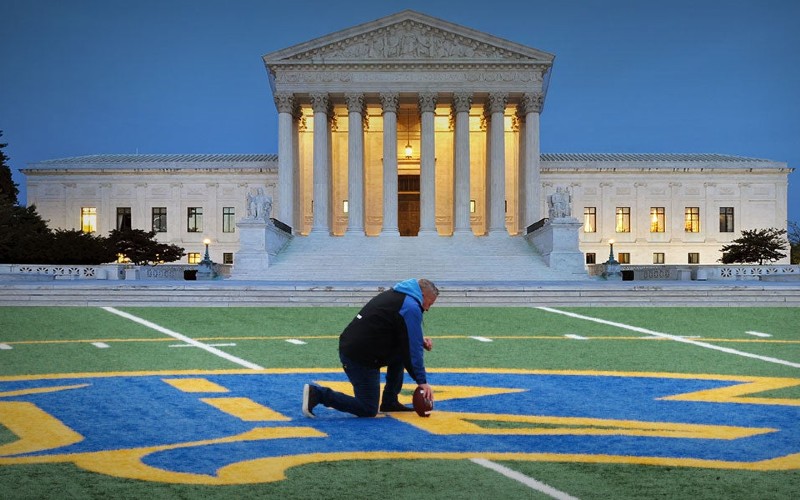Whether you believe Willis' case is sound – and some do not – or you believe her case was motivated by the passion to serve her constituents and the state of Georgia – and the U.S. House clearly does not – the act of going after Trump's legal team could have a lasting negative impact. Mike Davis, founder of The Article III Project, a nonprofit group that promotes and defends constitutionalist judges, is in the "negative impact" camp.
"It is so damaging to our republic. It is a bedrock constitutional right that you have the right to counsel; and if you don't have a right to counsel under our system, you're toast. It's an adversarial system," Davis said on American Family Radio Friday.

"It's not like the British inquisition system where you have a neutral arbiter trying to get to the truth behalf of the courts," he told show host Jenna Ellis. "In our system, it's the plaintiff and the defendant, the government or the defendant. They have to put on their own case; they have to put on their own prosecution; they have to put on their own defense. You can't really do that without an attorney."
In the 41-count indictment brought by Willis, Trump is charged with interfering with the 2020 election results in Georgia mostly with a plan involving the state's voters in the electoral college. The Fulton County DA has popularized the phrase "fake electors." The indictment also includes racketeering charges in an attempt to prove a broad criminal enterprise.
Also indicted are a handful of Trump's legal team. Willis' opponents say that's a blatant attempt to criminalize the practice of law. Davis agrees, saying the indictments place boundaries on the type of defense an attorney might prepare for a client – and the attorney can be jailed if he or she guesses wrong.
 Davis explained the American judicial system is set up to provide a voice for all citizens in need of legal representation, even those who cannot afford to purchase it for themselves. That protection extends even to a class that Davis describes as "very disfavored defendants."
Davis explained the American judicial system is set up to provide a voice for all citizens in need of legal representation, even those who cannot afford to purchase it for themselves. That protection extends even to a class that Davis describes as "very disfavored defendants."
Sometimes, he said, attorneys have to be creative in how they defend such people. He used alleged terrorists held at the Guantanamo Bay detention camp as an example.
"Think about this like the Gitmo detainees. They should be the most unpopular people on the planet because they waged war against the United States on 9-11 and killed thousands of people. They waged war in Afghanistan and Iraq. There's a chance, a small chance, that some of those people could be innocent. Do we want a system where an attorney represents a Gitmo detainee and makes a legal argument based on 'out there' legal theory … do we really want to criminalize that?" Davis asked.
Atlanta attorney sees flaws in Georgia case
Attorney Andrew Fleischman of the Atlanta-based firm Sessions & Fleischman in a New York Times op-ed called Willis' method of charging Trump "unusual and hard to prove."
"Here's the problem: It's hard enough to prove that Mr. Trump's request violates the Constitution, since the Constitution allows states to figure out how to select electors. But then the state must also prove that Mr. Trump knew this would violate the electors' oath of office," Fleischman wrote.
Not all defendants deemed by society as unpopular are guilty. Indicting the lawyers who might take them as clients sends a dangerous message, Davis said.
"If your legal argument is not accepted by the 'Uniparty,' you could face prison. That's insane. That's what you do in Zimbabwe and now apparently in New York, D.C., and Atlanta."
 One problem created by the attacks on attorneys is who gets to define an "out there" legal theory. Willis (right) is comfortable presenting that definition by naming Trump's defense team in her indictment.
One problem created by the attacks on attorneys is who gets to define an "out there" legal theory. Willis (right) is comfortable presenting that definition by naming Trump's defense team in her indictment.
A year ago a group of Georgia voters challenged the eligibility of Rep. Marjorie Taylor Greene (R) to run for reelection, charging that she "voluntarily aided and engaged in an insurrection to obstruct the peaceful transfer of presidential power, disqualifying her from serving as a member of Congress," The Associated Press reported.
The 14th Amendment says no one can serve in Congress "Who, having previously taken an oath, as a member of Congress … to support the Constitution of the United States, shall have engaged in insurrection or rebellion against the same."
The case against Greene was unsuccessful, but the attorneys were not prosecuted.
It's not your grandfather's Democratic Party
The political landscape has changed, according to Davis. "The distinction is that today's Democrats are leftists, they're Marxist; and it's not our parents' or grandparents' Democrat Party," he argued.
"These aren't liberals who love America and just disagree with conservatives on the best way to get there. These are Marxists. They hate free speech. They believe in censorship. They hate equality. They believe in equity. They hate due process. They believe in 'Me Too' presumption of guilt and the weaponization of our justice system."
Davis predicts Willis and the Democrats who support her won't take a victory lap and be content with taking down Donald Trump – if indeed that's how the Georgia indictment plays out.
"If you think this is going to stop with President Trump, you don't understand 100 years of Marxist history with 100 million people who have been murdered by these savages. Republicans need to wake up," Davis warned.







